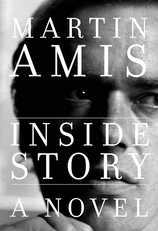A WRITER'S WIT |
My Book World

I believe this novel falls under the category of metafiction (Google: fiction in which the author self-consciously alludes to the artificiality or literariness of a work by parodying or departing from novelistic conventions). Martin or Mart becomes a character in his own work (à la Christopher Isherwood and others). His self-consciousness revolves around the writing of his own fiction, that of Saul Bellow, and others. As the customary disclaimer in the front matter states, “Names, characters, places, and incidents either are the product of the author’s imagination or are used fictitiously, and any resemblance . . . is entirely coincidental.” But how coincidental is it when “Martin” or “Mart” spends much of the book citing characters with real names, people like his father, author Kingsley Amis, people like longtime friend Christopher Hitchens, as well as other famous (Iris Murdoch) and not-so figures?
Amis begins and ends (“Preludial” and “Postludial”) the novel by addressing his readers directly, that he is about to give us tips concerning writing techniques. And he does: such advice is scattered throughout the (did I say?) novel, as if indeed, it is a how-to book and not a work of fiction. I like it. It’s odd, but I like it. You can’t help but believe he is digging down deep to reveal what has worked for him and speaks so authoritatively about writing (and with more than twenty-five books under his belt why shouldn’t he?).
However, Amis spends the final 150 pages or so memorializing the life and death of essayist and intimate, Christopher Hitchens. They’re both about the same age. Both straight, both with families. Yet they are Platonic lovers. Martin greets Christopher and sometimes leaves him with a kiss. As his fans will know, veteran smoker Hitchens develops throat cancer, and much of this section takes place at Houston’s MD Anderson Cancer Center. Amis takes readers through every painful step he witnesses in Hitch’s treatment. All to no avail. The man who has always seemed to battle against life and death in equal measures finally succumbs. That is in 2011. Perhaps writing in a fictional mode about this death allows Amis to conceptualize the work differently than if it were in a nonfiction mode. It allows him to eulogize his friend without getting too sentimental about it.
And yet—true to the title’s promise—Amis, I believe, does offer the writer, especially the writer of novels, some sage advice. Oh, and before I list a few nuggets along these lines, I’d like to say I detest the excessive footnotes, particularly in a work of fiction. Is it a kind of laziness by which the author cannot manage to incorporate these ideas into the main text? Or is it a way of padding an already lengthy book and forcing readers to peruse longs passages in teensy weensy little print? Or is it a way of showing off, of augmenting an already verbose passage even more? At any rate, here are some passages about writing:
“So avoid or minimise any reference to the mechanics of making love—unless it advances our understanding of character or affective situation. All we usually need to know is how it went and what it meant. ‘Caress the detail,’ said Nabokov from the lectern. And it is excellent advice. But don’t do it when you’re writing about sex” (27).
Knopf typo: “obviouly” (221).
“Never use any phrase that bears the taint of the second-hand. All credit to whoever coined no-brainer and (I suppose) to whoever coined go ballistic and Marxism lite and you rock and eye-popping and jaw-dropping and double whammy and all the rest of them. Never do it—not even in conversation” (391).
The end of a sentence is a weighty occasion. The end of a paragraph is even weightier (as a general guide, aim to put its best sentence last). The end of chapter is seismic but also more pliant (either put its best paragraph last, or follow your inclination to adjourn with a light touch of the gavel). The end of a novel, you’ll be relieved to learn, is usually straightforward, because by then everything has been decided. And with any luck your closing words will feel preordained (394).
NEXT FRIDAY: My Book World | Annie Proulx's Barkskins



 RSS Feed
RSS Feed